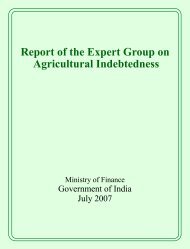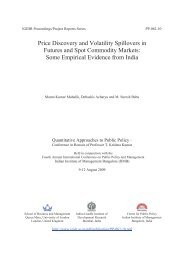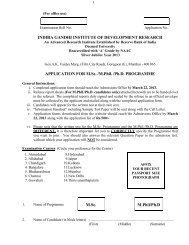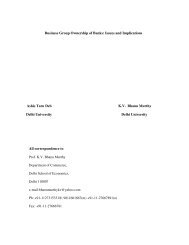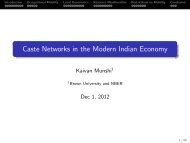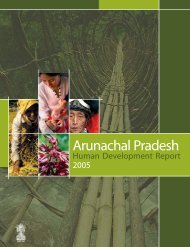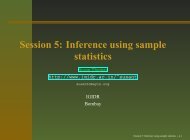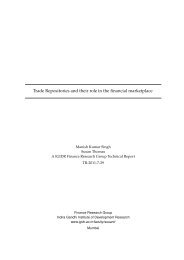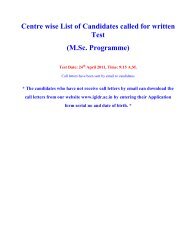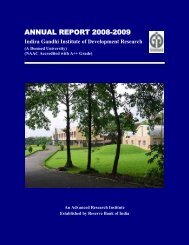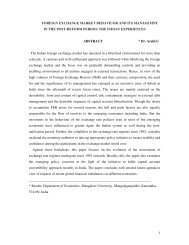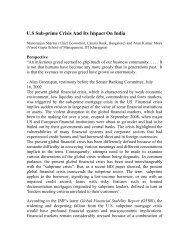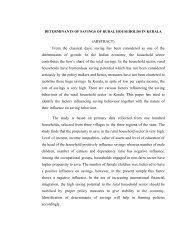National Human Development Report: 2001 - Indira Gandhi Institute ...
National Human Development Report: 2001 - Indira Gandhi Institute ...
National Human Development Report: 2001 - Indira Gandhi Institute ...
- No tags were found...
You also want an ePaper? Increase the reach of your titles
YUMPU automatically turns print PDFs into web optimized ePapers that Google loves.
NATIONAL HUMAN DEVELOPMENT REPORT <strong>2001</strong> EDUCATIONAL ATTAINMENTS AND WELL-BEING 61literacy and skills. The issue that isMahila Samakhya — Education for Women’s Equalityincreasingly becoming important, inthis context, is the need to haveThe Mahila Samakhya Project was initiated in 1987-89 for education andsensitive and progressive regulatoryempowerment of women in rural areas, particularly of women from socially andframework for maintaining andeconomically marginalised groups. The programme recognises the centrality ofimproving educational standards,education in empowering women to achieve equality and endeavours to create anensuring consumer protection, asenvironment for women to learn at their own pace, set their own priorities andwell as making such institutions anseek knowledge and information to make informed choices. This involves enablingintegral part of the educationalwomen to address and deal with problems of isolation and lack of self-confidence,system in the country.oppressive social customs, struggle for survival, all of which inhibit their learning.An important feature of theThe initiative focus on enabling a greater access to education, generating astrategy in States that have madedemand for education, build capacities and strengthen women’s abilities torapid strides in raising their literacyeffectively participate in village level processes for educational development.rates, apart from improvedenrolment rates of children inschool going age group, relates to the success in bringing down their drop outrates. States like Rajasthan, Madhya Pradesh, Haryana, Tamil Nadu, Punjaband Maharashtra have been able to bring down their drop out ratessignificantly. In case of Andhra Pradesh, Bihar, West Bengal and UttarPradesh these rates have, however, stagnated. In some States, theinvolvement of Panchayati Raj Institutions in the management of localschools at primary and upper primary levels and schemes aimed at providingnutritional supplements in the schools, such as the mid-day meal schemeparticularly in case of Tamil Nadu, have also contributed in improvingenrolments and retention in schools. Innovative changes in curriculum,including exposure to vocational training; flexibility in scheduling of schoolterms, particularly in rural areas, keeping in view the requirement of largesegment of children who are, invariably, drafted to meet seasonal demand forlabour in agriculture sector; and evening/night schools in urban areas havebeen seen to be helpful in improving enrolments and retaining children inschools for longer duration.An aspect of the current policy focus in education that has a bearingon the future prospects of educational attainment for the society at largerelates to the education of the girl child. Though, the Approach to the TenthPlan aims at bringing down gender gap in literacy by 50 per cent over theplan period, the target seems ambitious, unless significant headway is madein States like Bihar, Uttar Pradesh, Rajasthan, Orissa and Haryana.Initiatives like the Mahila Samakhya that focus on creating a greater access toeducation, generate demand for education, build capacities and strengthenwomen’s abilities to effectively participate in village level processes foreducational development have to be pursued vigorously in these Stateshaving significant differential in male-female literacy rates.Summing UpTo sum up, the policy for universalisation of elementary education hasto focus on a universal access and enrolment; universal retention of childrenup to 14 years of age; and policy framework for bringing about substantialimprovement in the quality of education including — improvement in



